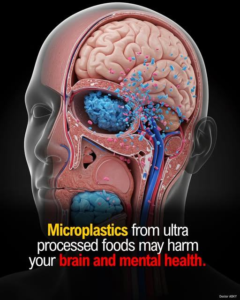Microplastics in the Brain: The Alarming Link Between Ultra-Processed Foods and Cognitive Decline
– Learn about home remedies for microplastic detox from NTA Wellness

Microplastics in the Brain: The Alarming Link Between Ultra-Processed Foods and Cognitive Decline
Recent scientific discoveries have revealed a disturbing truth: the human brain is accumulating microplastics—tiny particles of plastic less than 5 mm in size—at unprecedented levels. A 2024 study in Nature Medicine found that the brain can now contain microplastic amounts equivalent to a plastic spoon, with concentrations increasing by more than 50% between 2016 and 2024:
https://www.nature.com/articles/s41591-024-03453-1
Researchers also discovered that brain tissue contains more microplastics than the liver or kidneys, and that people with dementia showed significantly higher concentrations:
https://www.smithsonianmag.com/smart-news/the-human-brain-may-contain-as-much-as-a-spoons-worth-of-microplastics-new-research-suggests-180985995/
🧠 Crossing the Blood-Brain Barrier
Normally, the blood-brain barrier protects neural tissue from toxins. However, new findings show that nanoplastics (a subset smaller than 200 nanometers) are small enough to cross this barrier, accumulating in the brain and contributing to inflammation, oxidative stress, and neural damage:
https://www.prevention.com/health/health-conditions/a65102230/scientists-microplastics-brain-health-study
https://www.ncbi.nlm.nih.gov/pmc/articles/PMC9633860/
These effects are linked to rising rates of dementia, depression, anxiety, i sleep disorders.
🍟 Ultra-Processed Foods: A Major Vector
A growing body of research points to ultra-processed foods (UPFs) as a key source of microplastic exposure. These include packaged snacks, fast foods, and industrially produced items like chicken nuggets.
A 2023 study published in ACS Environmental Science & Technology found that some UPFs contain up to 30 times more microplastics than minimally processed foods such as chicken breasts:
https://pubs.acs.org/doi/10.1021/acs.est.3c04099
Meanwhile, UPFs make up over 50% of daily calorie intake in countries like the U.S. and the UK:
https://www.bmj.com/content/365/bmj.l1949
🚨 Scientists Call It a “Reckoning”
Experts are now calling this an epidemiological reckoning — a sign that plastic pollution is no longer just an environmental issue, but a direct and growing threat to neurological health.
As part of the response, scientists are proposing a Dietary Microplastic Exposure Index to track microplastic ingestion through food. Others are investigating whether medical procedures like apheresis (a type of blood filtration) might help remove microplastics from the body:
https://www.thetimes.co.uk/article/how-avoid-microplastics-brain-bottled-water-23fr6pl58
✅ What You Can Do
To reduce microplastic exposure:
-
Avoid UPFs and focus on whole foods.
-
Drink filtered water — microplastics have been found in both bottled and tap water.
-
Choose non-plastic food containers (glass, ceramic, stainless steel).
-
Support plastic pollution reduction policies.
Sources Recap:
-
Nature Medicine: https://www.nature.com/articles/s41591-024-03453-1
-
Smithsonian Magazine: https://www.smithsonianmag.com/smart-news/the-human-brain-may-contain-as-much-as-a-spoons-worth-of-microplastics-new-research-suggests-180985995/
-
Prevention.com: https://www.prevention.com/health/health-conditions/a65102230/scientists-microplastics-brain-health-study
-
NCBI Study: https://www.ncbi.nlm.nih.gov/pmc/articles/PMC9633860/
-
ACS Journal: https://pubs.acs.org/doi/10.1021/acs.est.3c04099
-
BMJ UPF Data: https://www.bmj.com/content/365/bmj.l1949
-
Times UK (Apheresis Concept): https://www.thetimes.co.uk/article/how-avoid-microplastics-brain-bottled-water-23fr6pl58
